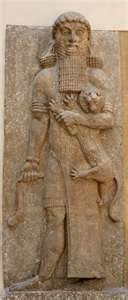The Epic of Gilgamesh
The Epic of Gilgamesh is one of the world's earliest hero stories; as such, it is the source for many other stories of its kind. Gilgamesh was a real person. His name appears on a list of kings of Uruk, a Sumerian city. The epic story in which he features was originally a series of spoken tales that were eventually written down, in cuneiform, on clay tablets. The most complete version comes from the library of the Assyrian king Ashurbanipal. The Epic is a buddy story. Gilgamesh embarks on the early part of his adventures with Enkidu, which whom he shares many characteristics and views of the world. Gilgamesh and Enkidu team up to defeat a giant that guards a grove of sacred trees. The Epic is a thoughtful story. The last part is the story of Gilgamesh (with Enkidu, who was killed) abandoning his quest for immortality and instead reflecting on the meaning of life and the way in which he would like to be remembered. The Epic has passed down several themes to later works. The most obvious is the story of an epic flood, which appears in the literary and religious traditions of most peoples. The Jewish and Christian faiths have the story of Noah and the Ark, which echoes the immortal man that Gilgamesh met after crossing the endless sea. The Bible also echoes the Epic in the story of a serpent's destroying dreams. In the Bible, the serpent plays a role in the expulsion of Adam and Eve from the Garden of Eden. In the Epic, Gilgamesh discovers the Flower of Youth, giving him the power to have his youth restored, but before he can use it loses it to a serpent. The stories of Greek gods and goddesses are full of echoes of the Epic: giants and bulls and monsters and floods and vengeance and vivid dreams. In the end, Gilgamesh comes to the realization that it is not how long he lives but his accomplishments that determine how people will think of him after he has gone. |
|
Social Studies for Kids
copyright 2002–2026
David White



 The Epic is an adventure story. Gilgamesh passes several tests of strength and will, including winning a fight to the death against an impossibly strong bull sent by one of the gods. He survives an epic journey across an endless sea in order to visit an immortal hero who survived a massive deadly flood by building a huge boxlike sailing vessel in which he carried his family and a large number of animals to safety.
The Epic is an adventure story. Gilgamesh passes several tests of strength and will, including winning a fight to the death against an impossibly strong bull sent by one of the gods. He survives an epic journey across an endless sea in order to visit an immortal hero who survived a massive deadly flood by building a huge boxlike sailing vessel in which he carried his family and a large number of animals to safety.
